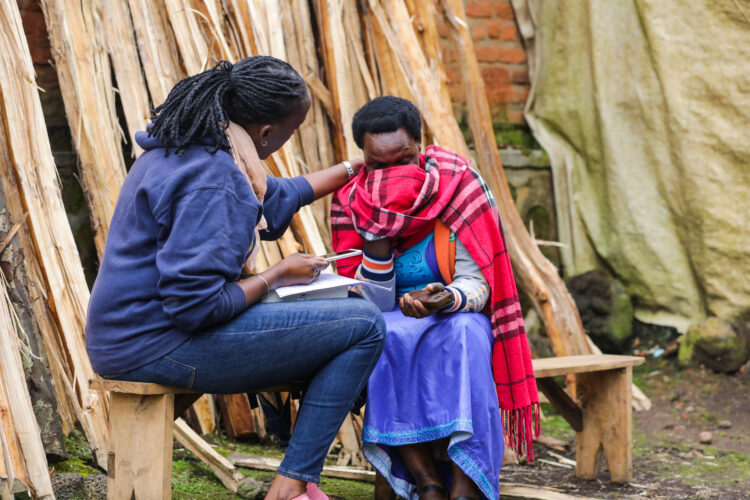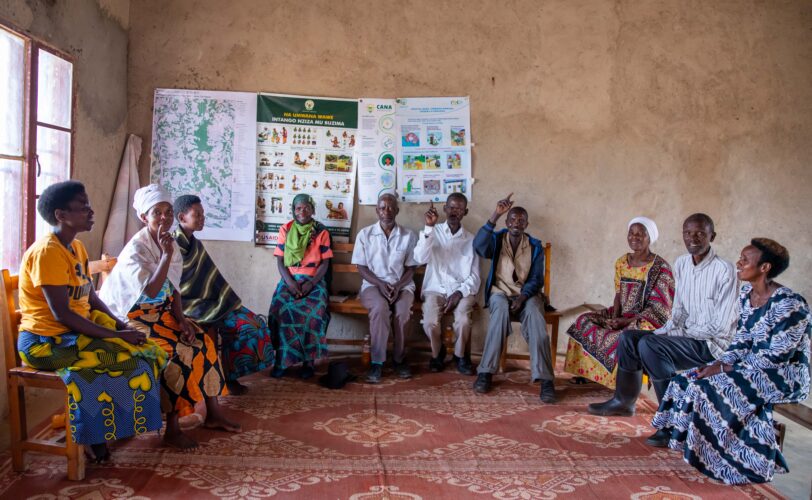A new group-based intervention has been proven effective in addressing mental health issues and strengthen psychological resilience in Rwanda

A study conducted to test a new psychological intervention – Resilience-oriented therapy (ROT)- has revealed its strong effectiveness in addressing mental health issues related to emotional regulation, identity development, and behavioural self-management as well as strengthening individual psychological resilience in Rwanda.
The Randomised Controlled Trial (RCT) - a prospective study that serves to measure the effectiveness of a new intervention or treatment - was conducted between April and September 2023 to test the effectiveness of ROT, a group-based, strengths-based and trauma-informed modular treatment protocol designed in the framework of the societal healing programme titled “Reinforcing Community Capacity for Social Cohesion and Reconciliation through Societal Trauma Healing Rwanda” jointly implemented by Interpeace and its local partners – Prison Fellowship Rwanda, Dignity in Detention and Haguruka – in close collaboration with the Ministry of Health through Rwanda Biomedical Centre (RBC) and the Ministry of National Unity and Civic Engagement (MINUBUMWE). The programme is funded by the Government of Sweden through its Embassy in Rwanda.
A significant proportion of Rwandans is still grappling with mental health issues stemming from the Genocide against the Tutsi. The Rwanda Mental-Health Survey (2018) revealed that the prevalence of several mental difficulties in the general population stands at 20.49% and is significantly higher than the global average with major depression being the most prevalent mental disorder (12.0%). Genocide survivors are the most affected (52%). Rwanda has made commendable strides in curbing and treating mental health issues and decentralising mental health and psychosocial support service care at the health centre level as well as integrating it into primary care.

Nevertheless, the scale of needs still outstrips the capacity of available professionals and infrastructure.
The country has only 16 psychiatrics (1 for 862,400 persons), 441 certified clinical psychologists (1 for 31,289 persons) and 202 mental health nurses (1 for 68,400 persons) working in public facilities. implementing a one-on-one approach and often prioritising medication over psychotherapy treatment. Additionally, there are just seven private clinics or hospitals offering mental health services.
In a collectivistic society like Rwanda, the one-on-one interventional approach – largely implemented across the country - does not enable professionals to provide cost-effective service. The utilisation of mental-health services remains low standing at only 5.3%.
ROT intervention protocol was developed to adequately respond to the existing gaps and support the Rwandan Government’s efforts in promoting mental health care provision for all. Its design blended the emerging international best practices with Rwandan context-specific tools to adapt it to the actual realities of the country.
The RCT study of ROT involved 394 community members (146 male and 248 female) selected from five districts, namely Nyagatare, Ngoma, Nyamagabe, Nyabihu and Musanze. After collecting pre-intervention data through a baseline assessment, participants were allocated into 49 groups falling under two categories: treatment (25 groups) with 211 participants and control (24 groups) with 181 participants.
Those who were allocated to treatment groups received ROT intervention in a group setting through 24 therapy sessions for a period of three months, followed by six weeks of follow up sessions. Group members met two times a week and engaged in healing dialogues facilitated by certified psychologists or mental health nurses who were assisted by trained counsellors. Those who were allocated into control group were put on a waiting list.
Post-intervention data were collected from both treatment and control groups and compared with baseline data and crosschecked to ascertain the effectiveness of the approach. The findings showed a significant increase in psychological resilience of participants who received the treatment while those in the control groups (waiting list) reported a decrease in resilience. The comparison between pre- and post-invention data demonstrated that depression rates dropped from 8.1 (22.5%) to 2.9 (8%), anxiety from 13.4 (33.5%) to 6.3 (15.7%), and borderline personality disorders from 4.5 (11.3%) to 2.6 (6.5%) among treatment group members.

The findings further indicated that the intervention significantly improved self-management skills, emotional well-being skills, collaboration skills and personal agency. Individuals in the treatment demonstrated enhanced capacity for adapting to changes, and effectively navigating life's challenges.
“My life was shrouded in darkness, and I couldn't see any hope for the future. I felt lost and isolated in my own world. Each day was a struggle, and despair seemed to be my constant companion. The Resilience-oriented therapy group became the turning point in my life. It provided me with a conducive environment and safe space where I could heal and grow. I learned how to face life's challenges head-on, how to bounce back from setbacks, and most importantly, how to cultivate a resilient mindset,” said a female Genocide survivor from Rukumberi Sector, Ngoma District who received ROT.
The intervention appears to have also had a small but promising effect on alcohol abuse and drug dependency. Those who were in treatment groups reported to have, at least significantly reduced alcohol intake. Findings also showed a promising effect in reducing aggression.
Mental health professionals commend ROT as an empirically validated cost-effective intervention for addressing various mental health difficulties and strengthening the resilience of individuals. “Resilience-oriented therapy connects people, enabling them to support each other in their journey of healing and resilience,” said Prof. Eugene Rutembesa, a university lecturer in clinical psychology at the University of Rwanda. He has incorporated this therapy into his lectures and advocates for its integration into the university curriculum to facilitate its wide dissemination and use.
